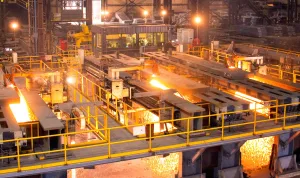Revolutionizing Steel Production: The Transformative Impact of Advanced Technology

Steel production, a cornerstone of modern industry, is undergoing a significant transformation driven by advancements in technology. From artificial intelligence and automation to green technologies and smart manufacturing, these innovations are not only enhancing efficiency and productivity but also paving the way for more sustainable and high-quality steel production. This article delves into the multifaceted impact of technology on the steel industry, providing a comprehensive overview of the current landscape and future prospects.
1. Automation and Robotics
Automation and robotics have revolutionized steel production by minimizing human error and optimizing processes. Advanced robotic systems handle tasks such as welding, cutting, and material handling with precision, speed, and consistency. These systems reduce labor costs and enhance workplace safety by performing hazardous tasks traditionally done by human workers.
Key Benefits:
- Increased productivity and efficiency.
- Enhanced safety and reduced risk of accidents.
- Lower operational costs and improved product quality.
2. Artificial Intelligence and Machine Learning
Artificial Intelligence (AI) and Machine Learning (ML) are at the forefront of the technological revolution in steel production. AI-driven predictive maintenance systems analyze vast amounts of data from machinery to predict failures before they occur, reducing downtime and maintenance costs. ML algorithms optimize production processes by analyzing patterns and making real-time adjustments to improve yield and quality.
Key Benefits:
- Predictive maintenance leading to reduced downtime.
- Process optimization for better yield and quality.
- Data-driven decision-making enhancing overall efficiency.
3. Internet of Things (IoT)
The integration of IoT in steel manufacturing allows for real-time monitoring and control of production processes. Sensors embedded in equipment collect data on various parameters such as temperature, pressure, and humidity, which are then analyzed to ensure optimal operating conditions. IoT-enabled smart factories facilitate seamless communication between machines, leading to synchronized operations and improved efficiency.
Key Benefits:
- Real-time monitoring and control.
- Improved process synchronization and efficiency.
- Enhanced data collection and analysis for continuous improvement.
4. Sustainable and Green Technologies
Sustainability is a critical focus in modern steel production, with technology playing a pivotal role in reducing environmental impact. Innovations such as electric arc furnaces (EAF) and hydrogen-based steelmaking processes significantly cut carbon emissions. Additionally, advancements in recycling technologies allow for the efficient reuse of scrap steel, minimizing waste and conserving resources.
Key Benefits:
- Reduced carbon footprint and environmental impact.
- Efficient recycling and waste reduction.
- Compliance with stringent environmental regulations.
5. Advanced Materials and Metallurgy
Technological advancements in metallurgy have led to the development of high-performance steels with superior properties such as increased strength, durability, and corrosion resistance. These advanced materials are crucial for industries such as automotive, construction, and aerospace, where performance and reliability are paramount.
Key Benefits:
- Development of high-performance steel grades.
- Enhanced material properties for diverse applications.
- Improved product performance and lifespan.
6. Digital Twin Technology
Digital twin technology involves creating a virtual replica of a physical production system. This digital model allows manufacturers to simulate, analyze, and optimize processes in a virtual environment before implementing changes in the real world. Digital twins enable proactive maintenance, process optimization, and design improvements, leading to increased efficiency and reduced costs.
Key Benefits:
- Virtual simulation and testing.
- Proactive maintenance and optimization.
- Cost-effective process improvements.
Conclusion
The integration of advanced technology in steel production is revolutionizing the industry, driving improvements in efficiency, sustainability, and product quality. From automation and AI to IoT and green technologies, these innovations are transforming traditional manufacturing processes and setting new standards for the future. As the industry continues to evolve, embracing these technological advancements will be crucial for staying competitive and meeting the demands of a rapidly changing market.



